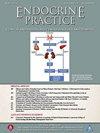Central Hypothyroidism: Advances in Etiology, Diagnostic Challenges, Therapeutic Targets, and Associated Risks
IF 3.7
3区 医学
Q2 ENDOCRINOLOGY & METABOLISM
引用次数: 0
Abstract
Objective
Central hypothyroidism is a rare disorder resulting from impaired thyroid hormone production due to deficiencies in TSH secretion from the pituitary or TRH secretion from the hypothalamus. This review aims to summarize recent advances in the etiology, diagnosis, and treatment of central hypothyroidism, with an emphasis on diagnostic and therapeutic challenges.
Methods
A comprehensive review of the literature was conducted, focusing on genetic and acquired causes, particularly those related to hypothalamic–pituitary tumors and the effects of surgical and radiotherapeutic interventions. Diagnostic approaches and treatment strategies, including levothyroxine therapy and monitoring, are analyzed.
Results
Early diagnosis requires simultaneous measurement of free T4 and TSH to prevent neurological sequelae, especially in congenital cases. Central hypothyroidism is associated with risks such as growth and developmental impairment, as well as metabolic and cardiovascular disturbances. Levothyroxine therapy is crucial for correcting hormonal deficits and improving patient outcomes; however, careful dosing is necessary to avoid potential complications, particularly in vulnerable populations.
Conclusions
Personalized treatment and continuous monitoring are essential to optimize clinical outcomes and enhance the quality of life in affected individuals. A thorough understanding of central hypothyroidism's etiology and management is necessary to improve early detection and therapeutic strategies.
中枢性甲状腺功能减退:病因、诊断挑战、治疗靶点和相关风险的进展。
中枢性甲状腺功能减退症是一种罕见的疾病,其特征是由于垂体分泌TSH或下丘脑分泌TRH的缺陷导致甲状腺分泌甲状腺激素不足。其病因包括遗传原因和获得性原因,主要与下丘脑-垂体区肿瘤或手术和放疗等治疗有关。本文综述了其病因、诊断和治疗方面的进展,重点讨论了诊断和治疗方面的挑战。它强调了测量伴随游离T4和TSH对早期发现和预防神经系统后遗症的重要性,特别是在先天性中枢性甲状腺功能减退症中。相关风险包括生长和发育障碍,以及代谢和心血管改变。左甲状腺素治疗对于纠正激素失衡和提高生活质量至关重要,但需要谨慎避免过量使用,特别是在脆弱人群中。强调个性化治疗和持续监测的重要性,以确保最佳的临床结果和促进最佳的生活质量。
本文章由计算机程序翻译,如有差异,请以英文原文为准。
求助全文
约1分钟内获得全文
求助全文
来源期刊

Endocrine Practice
ENDOCRINOLOGY & METABOLISM-
CiteScore
7.60
自引率
2.40%
发文量
546
审稿时长
41 days
期刊介绍:
Endocrine Practice (ISSN: 1530-891X), a peer-reviewed journal published twelve times a year, is the official journal of the American Association of Clinical Endocrinologists (AACE). The primary mission of Endocrine Practice is to enhance the health care of patients with endocrine diseases through continuing education of practicing endocrinologists.
 求助内容:
求助内容: 应助结果提醒方式:
应助结果提醒方式:


